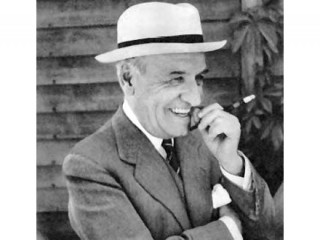
Jose Ortega Y Gasset biography
Date of birth : 1883-05-09
Date of death : 1995-10-18
Birthplace : Madrid, Spain
Nationality : Spanish
Category : Science and Technology
Last modified : 2011-08-11
Credited as : Philiosopher, essayist,
The Spanish philosopher and essayist Jose Ortega y Gasset is best known for his analyses of history and modern culture, especially his penetrating examination of the uniquely modern phenomenon "mass man."
Jose Ortega y Gasset was born in Madrid on May 9, 1883. He studied with the Jesuits at the Colegio de Jesutas de Miraflores del Palo, near Malaga, and from 1898 to 1902 he studied at the University of Madrid, from which he received the degree of licenciado en filosofia y letras. In 1904 Ortega earned a doctor's degree at Madrid for a dissertation in philosophy. From 1905 to 1907 he did postgraduate studies at the universities of Leipzig, Berlin, and Marburg in Germany. Deeply influenced by German philosophy, especially the thought of Hermann Cohen, Wilhelm Dilthey, Edmund Husserl, and Martin Heidegger, as well as by the French philosopher Henri Bergson, Ortega sought to overcome the traditional provincialism and isolation of philosophical study in his native Spain.
From 1910 to 1936 Ortega taught philosophy at the University of Madrid. Early in his career he gained a reputation through his numerous philosophical and cultural essays, not only in literary journals but also in newspapers, which were a peculiar and important medium of education and culture in pre-Civil War Spain. Ortega's most famous book, The Revolt of the Masses (1930), first appeared in the form of newspaper articles. Throughout his career he was generally active in the cultural and political life of his country, both in monarchist and in republican Spain. In 1923 Ortega founded the journal Revista de Occidente, which flourished until 1936.
After the outbreak of the Spanish Civil War in 1936, Ortega left Spain and lived abroad, dwelling in France, Holland, Argentina, and Portugal until the end of World War II. He returned to Spain in 1945, living there and in Portugal, with frequent trips and stays abroad, until his death. In 1948, together with Julián MarÃas, Ortega founded the Instituto de Humanidades, a cultural and scholarly institution, in Madrid. In 1949 Ortega lectured in the United States, followed by lectures in Germany and in Switzerland in 1950 and 1951. He received various honorary degrees, including a doctorate honoris causa from the University of Glasgow. Ortega died in Madrid on Oct. 18, 1955.
Ortega's numerous and varied writings, in addition to The Revolt of the Masses, include The Modern Theme (1923), The Mission of the University (1930), On Love (1940), History as System (1941), Man and People (1957), Man and Crisis (1958), and What Is Philosophy? (1958). Often mentioned, as is Miguel de Unamuno, with the existentialists, Ortega expounded a philosophy that has been called "ratiovitalism" or "vital reason," in which he sought to do justice to both the intellectual and passional dimensions of man as manifestations of the fundamental reality, "human life."
















